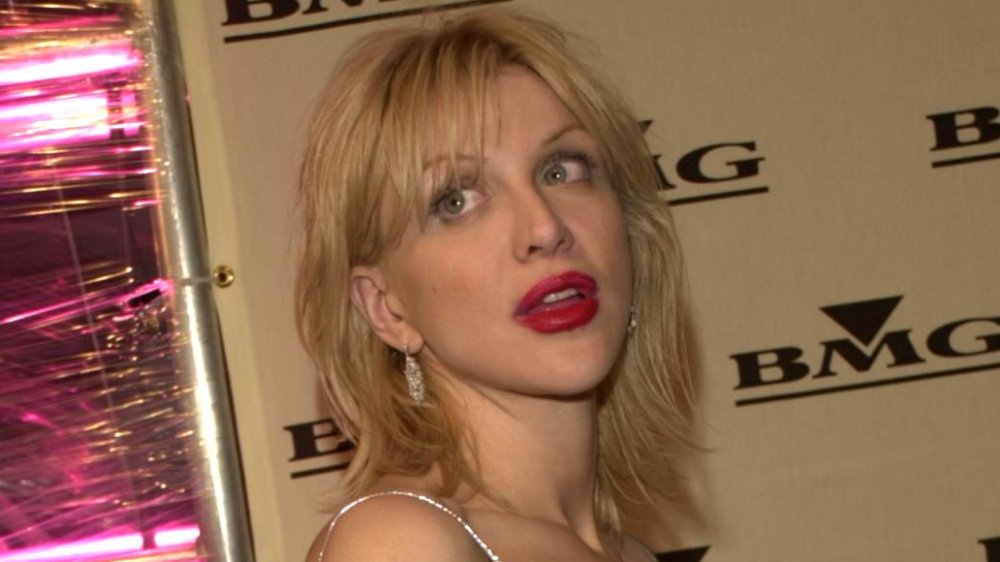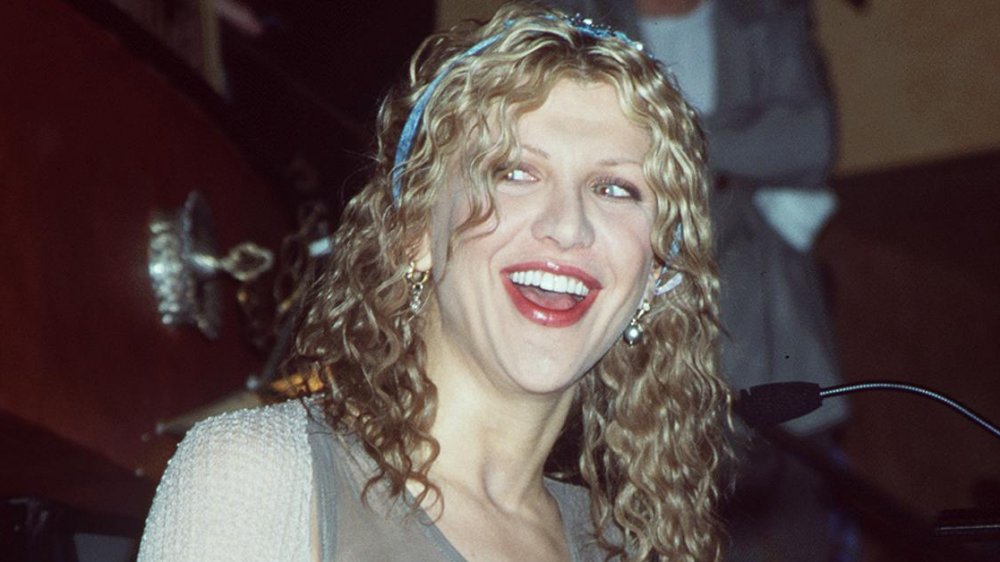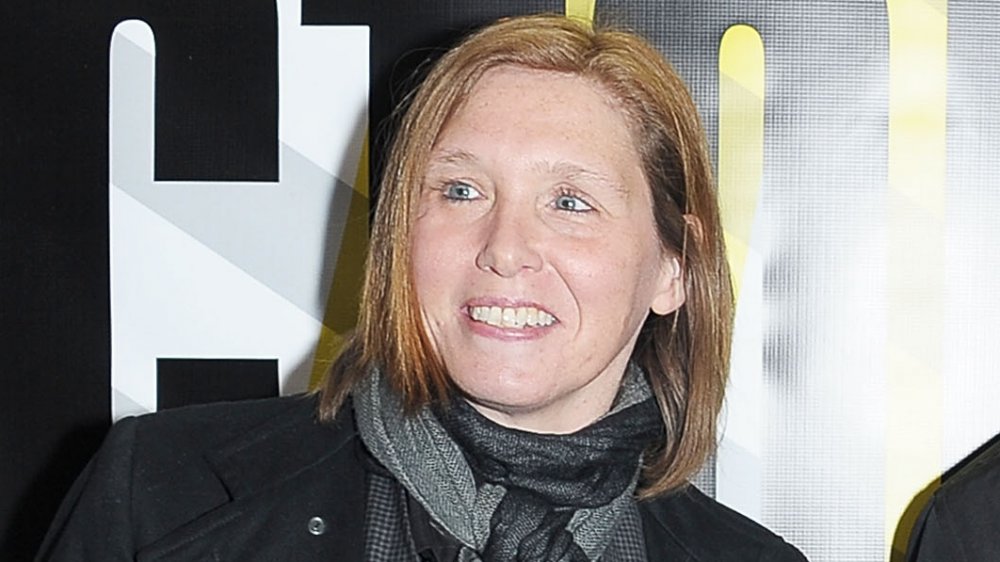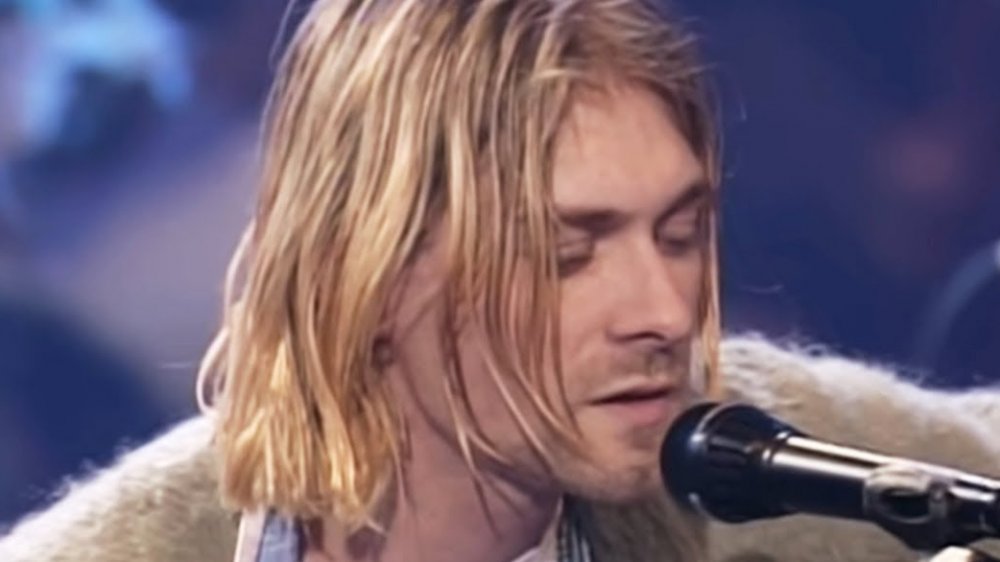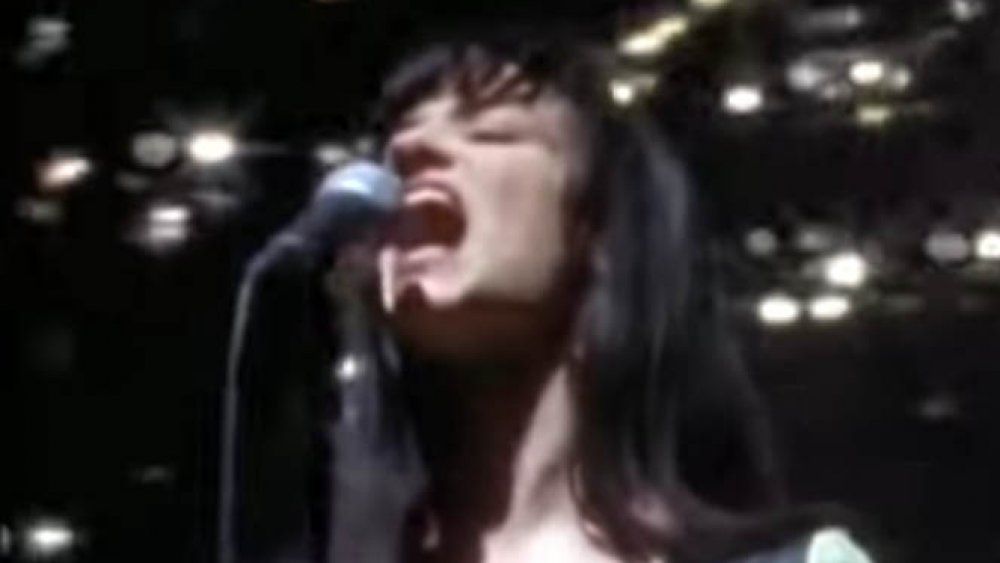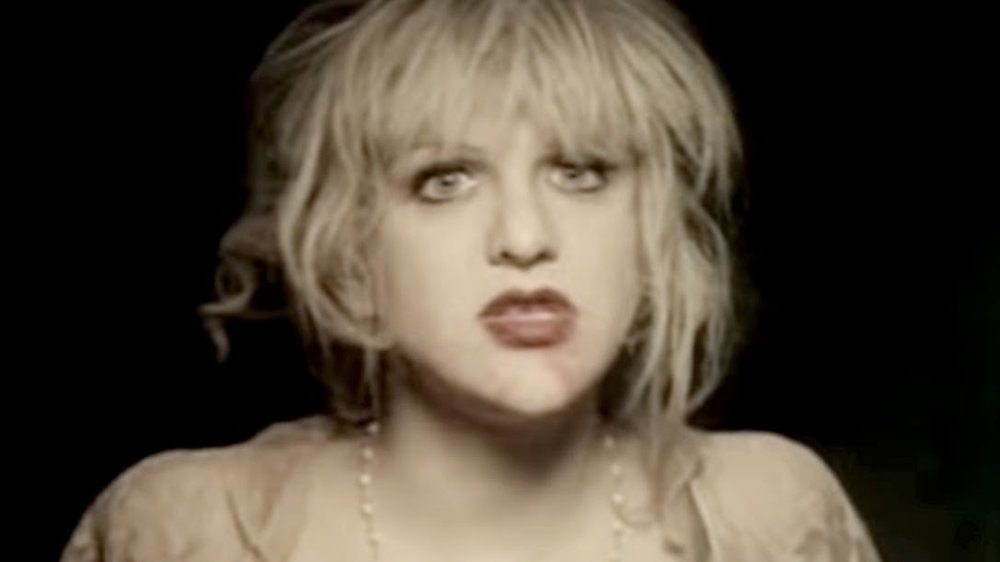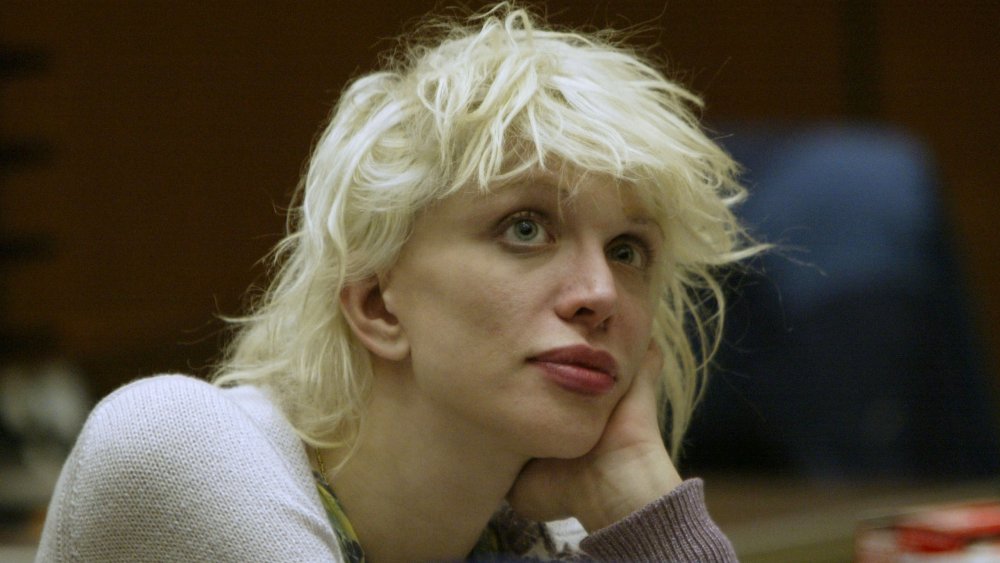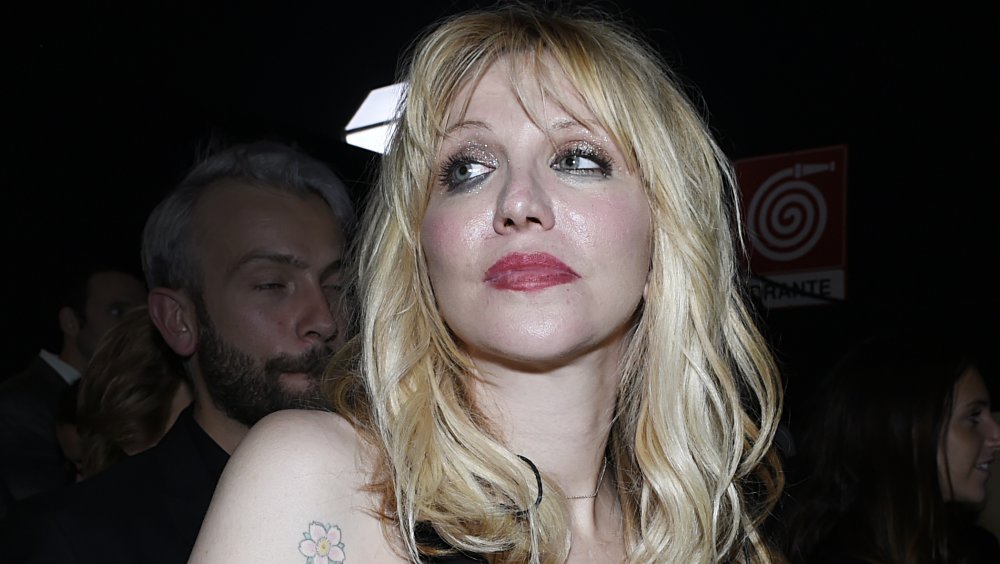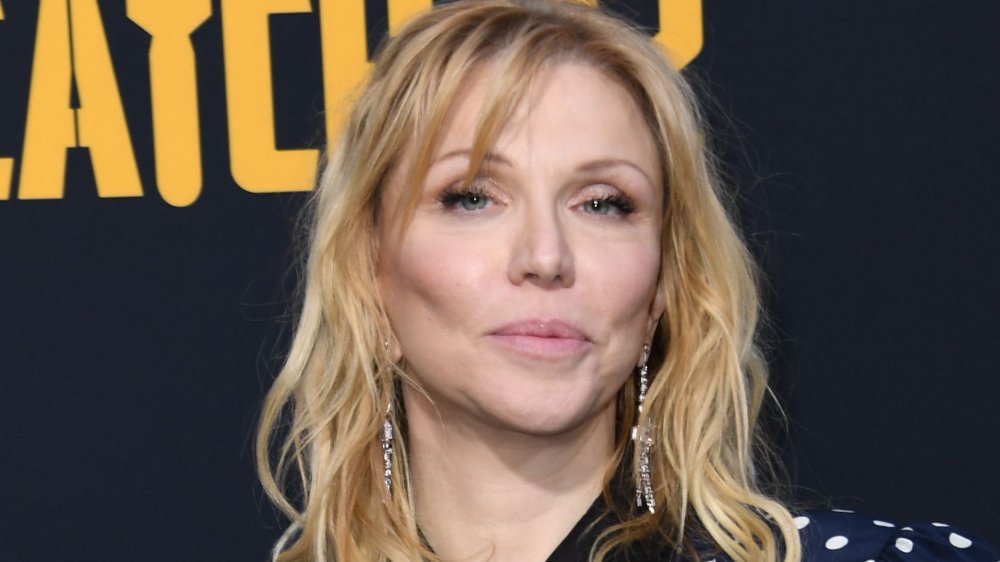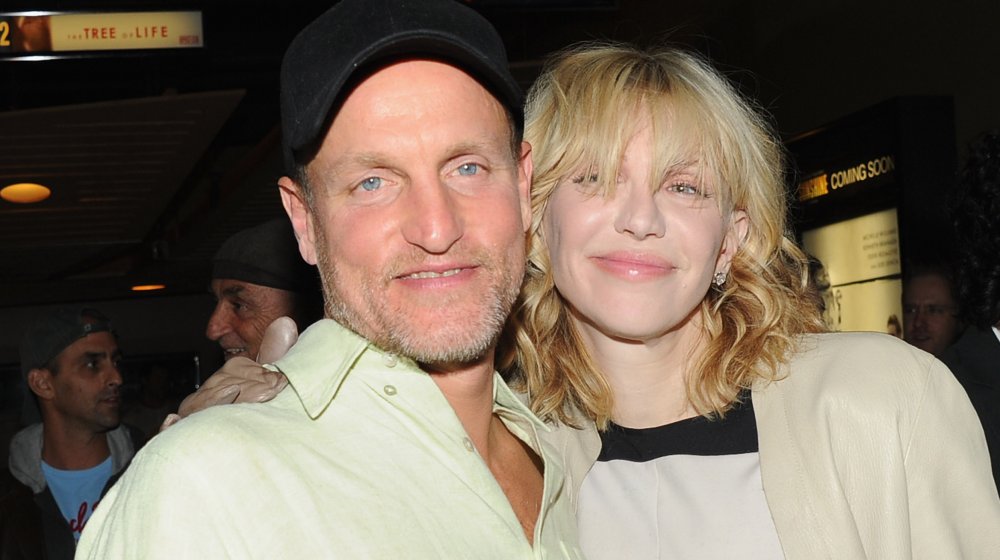The Tragic Real-Life Story Of Hole
Of all the really cool, hard-edged, down-tuned grunge bands of the mid-'90s, few were as compelling as Hole. Fronted by the charismatic, outspoken, and boundary-pushing Courtney Love, Hole was all over MTV and alt rock radio with hits like "Miss World," "Doll Parts," "Celebrity Skin," and "Malibu." Love proved to be an irresistible media magnet, as famous for her often acrimonious relationships with other rock stars (not to mention her brief marriage to the late Nirvana singer Kurt Cobain) as she was for her and her band's acclaimed musical output.
While Hole was definitely Love's group and her musical mouthpiece, it did operate like a regular band, if regular means "complicated" and "chaotic." Meanwhile, its members, including guitarist Eric Erlandson, drummer Patty Schemel, and bassist Kristen Pfaff, all suffered terrible tragedies throughout their adult lives. With that in mind, here's a look at the tragic real-life story of the musicians from Hole.
Courtney Love's troubled youth
Wild and complicated adults — the kind who become hard-living rock stars — often start out as troubled kids and teenagers. That's definitely the path followed by Hole mastermind Courtney Love. Born Courtney Michelle Harrison in 1964, her parents had split by the end of the decade. Her mother, therapist Linda Carroll, divorced Courtney's father, Grateful Dead biographer Hank Harrison, and, according to SFGate, retained full custody after alleging that he'd given their toddler daughter LSD. Carroll remarried and divorced a few more times and at one point moved to New Zealand, taking Courtney with her. The future rock star was later thrown out of her boarding school and sent back to the US, where she lived with a friend of her mother's in Oregon.
As a junior high student, Love befriended three teenage prostitutes. "I just wanted to hang out with them," she told The Sunday Times. "I ended up going through the juvenile system with them because I got arrested shoplifting a Kiss T-shirt." That led to a stint at the Hillcrest Youth Correctional Facility in Salem, Oregon, and at age 16, Love's mother emancipated her, setting Love off on a worldwide walkabout that lasted for years. At 17, she found steady employment. "She was topless dancing in Portland," her father told Seattle Weekly. "She was underage so she changed her name" to Courtney Love.
Hole drummer Patty Schemel became a homeless drug addict
Drummer Patty Schemel played on Hole's 1994 commercial breakthrough Live Through This but left while recording its slick 1998 follow-up Celebrity Skin. Schemel struggled with an addiction to heroin in the mid-'90s but had been clean for a few months when Hole went into the studio to record Celebrity Skin under the eye of Aerosmith and Ozzy Osbourne producer Michael Beinhorn.
Beinhorn was very hard on Schemel: "I had written these drums parts, and this a**hole was telling me I wasn't executing them enough," Schemel wrote in her memoir Hit So Hard (via Pitchfork). According to a tech, Beinhorn hung out in the booth and read the newspaper, with the speakers turned off, when Schemel lay down her tracks — alone, with no other Hole members around. Eventually, Beinhorn convinced Love to fire Schemel in favor of a session drummer. "It took about five minutes to get un-sober again after that." She went home, and "within minutes," she wrote, her girlfriend had arrived with "a balloon of dope in hand."
It was a quick downward spiral for Schemel, who soon found herself homeless and working as a prostitute for drug money. Schemel told Seattle radio station KEXP that she ultimately climbed out of her life as a drug addict on the skids after 48 trips to rehab.
Courtney Love's husband committed suicide
Several members of Hole were close with Nirvana leader Kurt Cobain. Courtney Love was married to him, they had a daughter named Frances Bean together, guitarist Eric Erlandson considered him a friend, and Patty Schemel joined Hole after her pal Cobain introduced her to Love. Cobain died in April 1994 at at age of 27, committing suicide in his Seattle home after fighting severe depression and drug addiction for years.
According to Rolling Stone, the death came with some sad and ugly warning signs: Earlier in 1994, Cobain almost died of a drug overdose after a tour stop in Rome. In March, Love called police to the home she shared with Cobain when after a fight, he locked himself in a room with a handgun and threatened to kill himself. While authorities confiscated several bottles of pills and four guns, Cobain said he hadn't really planned on taking his life that night. Nevertheless, Cobain continued to battle his many demons, and after reportedly going missing for six days, his body was found in his home. He'd died from a self-inflicted gunshot wound.
Hole bassist Kristen Pfaff died of a drug overdose
Just two months after the death of close band associate Kurt Cobain, another tragic, far-too-early musician death unnerved Hole. According to Entertainment Weekly, on June 16, 1994, the band's bassist, 27-year-old Kristen Pfaff, was found dead in the bathtub at her apartment in Seattle. The Seattle Times reported that authorities believed Pfaff, who had used heroin in the past, died of drug-related causes, having discovered syringes and other drug ephemera in the room where the bassist died. "This is all the more tragic because she had gone through a drug-rehabilitation program this past winter," Ed Rosenblatt, president of Hole's label, DGC Records, said in a statement.
Pfaff reportedly hated Seattle and was only in the city temporarily, visiting for Cobain's funeral and to grab her personal effects before moving back to her home in Minneapolis. Pfaff's family barred the surviving members of Hole from attending the funeral. "It wasn't anything personal," said the musician's father, Norm Pfaff. "We just didn't want any publicity."
Courtney Love blames a reporter for destroying her life
There wasn't a more compelling rock star couple in 1992 than Kurt Cobain and Courtney Love. The pair married earlier that year, and when Love was pregnant with their daughter, Frances Bean, journalist Lynn Hirschberg profiled the couple for the September 1992 issue of Vanity Fair. Hirschberg explored the couple's experiences with heroin, including an assertion that Love used it while with child. "It is appalling to think that she would be taking drugs when she knew she was pregnant," said an unnamed friend of the couple. By the time that story hit newsstands, Love had given birth, and the reports that she'd used heroin during pregnancy led to child services temporarily removing weeks-old Frances Bean from her parents' custody.
Love long held a grudge. "As a writer, wouldn't it be your worst nightmare if you drove someone to suicide? I hope so," Love said in a 2011 interview with The Fix. She went on to explain that Hirschberg did just that, having "humiliated and emasculated" Cobain with the article. "She deserves most of the blame for his death." However, in the same interview, Love confirmed that she had, in fact, used heroin in the early weeks of her pregnancy. "But so f*cking what!? I didn't even know I was pregnant at the time!" she explained.
Courtney Love had a very public meltdown
The year 1994 was terrible for Hole, what with the deaths of Kurt Cobain and Kristen Pfaff. But it also marked Hole's peak. Released on April 12, 1994, (just a week after Cobain's death) the band's heavily praised Live Through This sold over a million copies and generated four hit singles – "Miss World," "Doll Parts," "Violet," and "Asking for It" — that became part of the alternative rock canon. But being in a deep mourning left Love unable to enjoy any of it. In early 1995, she was arrested after getting into a skirmish on a flight. A few months later, she punched two fans at a Hole show in Florida. "One of the lowest periods of my life was going to Orlando, Florida and thinking I was going to jail," Love said on Behind the Music. (A judge dismissed the case, citing insufficient evidence.) Around the same time, Love punched Bikini Kill singer Kathleen Hanna at Lollapalooza.
Love may not even remember a lot of those incidents. "I took a lot of a drug called Rohypnol," Love said on Behind the Music, referring to a sleep medication also known as "roofies." "I was asking somebody why Rohypnol has such a bad rap. And they said 'horrible memory loss.' Well, that's what happens when I meet somebody and I don't know if I hate them or like them or what."
Courtney Love was in and out of various institutions during the 2000s
Courtney Love was frequently in the news from 2003 to 2005, but it wasn't for her music. In October 2003, according to People, Love broke some windows at her boyfriend's house, was arrested for being under the influence of a controlled substance, and then went home and took more painkillers, leading her 11-year-old daughter, Frances Bean, to call an ambulance. Love lost temporarily lost custody of her daughter over the incident, and after telling a friend she was considering suicide, she was checked into a psychiatric facility against her will for 24 hours.
Problems continued into 2004 according to the Associated Press, when, hours after flashing David Letterman multiple times during an appearance on his eponymous show, she was arrested for hitting a fan with a mic stand during a club concert. Weeks later, according to CNN, she allegedly attacked a woman with a metal flashlight and a bottle. After failing to appear for an arraignment on an assault charge, Love was arrested on July 9, 2004 — her 40th birthday, per Entertainment Weekly – and was placed on a 72-hour watch at a hospital. A year later, Love, on probation for various offenses, admitted to a judge that she'd violated the terms of that agreement by using drugs and was ordered into a 28-day rehab program. In order to avoid prison time for her crimes, she accepted an additional 180-day rehab stay.
Courtney Love was sued for defamation
When Courtney Love briefly became the toast of Tinseltown for her work in The People vs. Larry Flynt in 1996, she showed up on red carpets in fancy gowns, giving her a taste for expensive, bespoke designer clothes, something that continued long past the demise of Hole. According to Rolling Stone, back in the 2000s, fashion designer Dawn Simorangkir put some clothes together for Love and then, get this, demanded that Love pay for those things. Love grew extremely displeased by this and took to Twitter, where she posted a series of anti-Simorangkir tweets, alleging that the designer had a violent past, had lost custody of her child, and was comparable to "a drug-pushing prostitute." In a legally groundbreaking case, in 2009, Simorangkir sued Love for defamation, as Love's large Twitter following had caused damage to the fashion designer's reputation and career.
According to The Hollywood Reporter, Love settled the suit outside of court for $430,000. Not quite ready to move on, Love once more publicly attacked Simorangkir, accusing her of theft and mocking her small following on Pinterest, and then discussed the first lawsuit on The Howard Stern Show. We say "first lawsuit" because Simorangkir sued Love for defamation again. She won that time, too, with Love settling for an additional $350,000.
Courtney Love got a restraining order against her manager
In 2010, Courtney Love met Sam Lufti, a powerful manager best known for handling the career of Britney Spears. "He became a friend over time, and eventually became a trusted advisor," Love attested in some legal documents filed in 2018 (via Spin). "With the benefit of hindsight, this was a huge mistake."
The singer ended her relationship with Lufti after tiring of what she alleged to be numerous instances of verbal abuse, threats, and stalker behavior. Love said she received calls at home and on her cell phone from Lufti "at all hours of the day and night" along with texts, one of which instructed Love to "go choke on opiates and die." Another text hints at a blackmail ploy: "all of your sh*t is going public Friday morning.. don't say you weren't warned." Love chalked up a bunch of frightening and aggressive comments on her social media accounts to Lufti posting under fake names and claimed that he had been using her email address without her knowledge. In 2018, Love asked a judge for — and received — a restraining order against her former manager.
Did Hollywood blacklist Courtney Love?
Rock stardom via Hole was technically a sideline for Courtney Love. Long before she got into music, Love was an actress, appearing in a few '80s cult classic films like Sid and Nancy, Straight to Hell, and Tapeheads. After Hole — both its music and associated dramas — made her a household name, Love returned to playing professional make-believe, landing roles in three big 1996 movies: Feeling Minnesota, Basquiat, and The People vs. Larry Flynt. Love earned great notices for her performance in the latter as Althea Leasure Flynt, the late wife of Hustler publisher Larry Flynt. She collected numerous awards and accolades, including a Golden Globe nomination.
Despite that, Love only landed a handful of major acting roles afterward. What happened? According to Love, Hollywood rejected her. In 2006, Love told The Guardian that she was "in actor jail" and couldn't get cast in anything, likely because others were afraid they'd have to deal with the inconsistent and unpredictable Courtney Love of yore. Also, still miffed over losing the role of Satine in Moulin Rouge to Nicole Kidman, Love told a reporter that the actress took all the good parts for herself. She also offended another power player, Steven Spielberg, to the point where she had to write him an apology letter in an attempt to placate him enough so he'd cast her in a dream project about rival 19th-century actresses.
